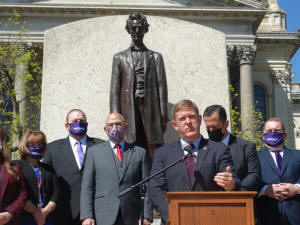Bills call for modernizing FOID, CCL systems
 Send a link to a friend
Send a link to a friend
[April 15, 2021]
By Peter Hancock
Capitol News Illinois
phancock@capitolnewsillinois.com
 SPRINGFIELD – A bipartisan group of
lawmakers are backing legislation that seeks to modernize the way the
Illinois State Police processes and issues Firearm Owners Identification
cards and Concealed Carry Licenses, a change that supporters say would
speed up the process and improve public safety. SPRINGFIELD – A bipartisan group of
lawmakers are backing legislation that seeks to modernize the way the
Illinois State Police processes and issues Firearm Owners Identification
cards and Concealed Carry Licenses, a change that supporters say would
speed up the process and improve public safety.
Senate Bill 1165, and its companion, House Bill 745, would essentially
turn FOID cards and Concealed Carry Licenses into a single card so when
someone renews their Concealed Carry License, their FOID card would
automatically renew.
It would also provide for automatic renewals for people who voluntarily
agree to submit fingerprints. And it calls on ISP to develop an internet
portal in which state, local and federal law enforcement agencies could
access information about people whose FOID cards have been revoked or
suspended.
“What this would do is, it really would modernize the FOID card,” Rep.
Jay Hoffman, D-Swansea, lead sponsor of the House bill, said during a
news conference Wednesday. “This is an initiative of the Illinois State
Police, and eventually we will have digital FOID cards, which I guess
wouldn't be a card at all, would it? It would be on your phone.”

ISP Director Brendan Kelly said the agency was inundated with new and
renewal FOID card applications last year, which he attributed in part to
the “social tensions caused by civil unrest and the global pandemic.”
From 2017 to 2020, he said, FOID card applications grew 167 percent,
from roughly 166,000 to 460,000.
The surge in applications over the last year stretched ISP’s resources,
resulting in a massive backlog of applications that have not been
processed within the required 30-day time frame.
“And really, I tell people that other than unemployment issues, FOID
issues are the biggest calls I get in my office,” said Sen. David
Koehler, D-Peoria, lead sponsor of the Senate bill.
Kelly said the agency has made significant progress in reducing that
backlog, primarily by hiring additional staff and improving internal
processes to be more efficient, but he said the entire system needs to
be modernized to meet current demands.
[to top of second column]
|

Illinois State Police Director Brendan Kelly joins a
bipartisan group of lawmakers during a news conference outside the
Statehouse to promote legislation that would modernize the state’s
system for issuing Firearms Owners Identification cards and
Concealed Carry Licenses. (Capitol News Illinois photo by Peter
Hancock)

“We need the support of the General Assembly to push this over the
edge,” he said. “We need the support of the General Assembly to
implement these measures that will help us finally turn the corner
and bring this system into the 21st century.”
The bill had support from at least five Republican lawmakers as
cosponsors as of Wednesday afternoon.
Gun safety advocates, on the other hand, said in a statement that
the bill does very little to improve public safety, mainly because
it does not include provisions such as universal background checks
and required fingerprint checks for all gun purchases.
“Senator Koehler’s gun lobby-backed bill guts real universal
background checks in exchange for nothing,” Kathleen Sances,
president of Gun Violence Prevention PAC Illinois, said in a
statement.
She noted that current law requires unlicensed gun dealers to see a
valid FOID card but does not require them to run background checks
to verify a potential buyer’s mental health or criminal history.
Kelly, however, defended Illinois’ current FOID card system, noting
that in calendar year 2020 alone, more than 15,000 FOID cards were
revoked and more than 5,100 unlawful attempts to purchase firearms
were stopped.
Kelly also said the agency is not requesting any change in the fee
structure for either license.
Capitol News Illinois is a nonprofit, nonpartisan
news service covering state government and distributed to more than
400 newspapers statewide. It is funded primarily by the Illinois
Press Foundation and the Robert R. McCormick Foundation.
 |